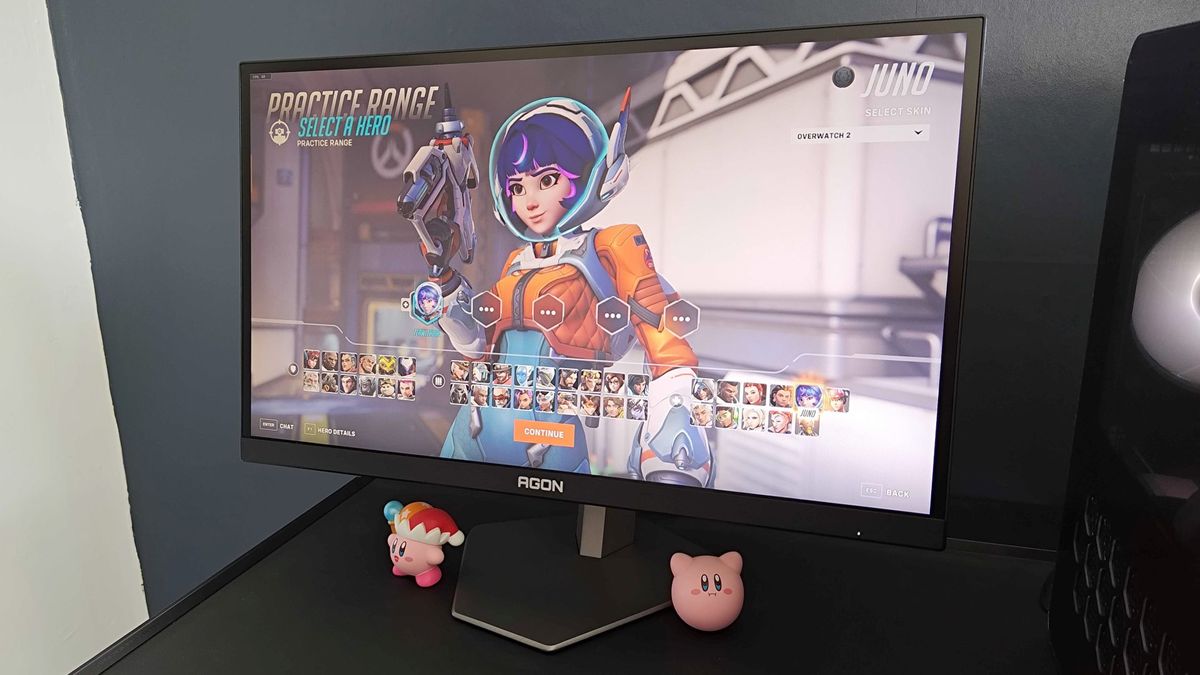12DOVE Verdict
The AOC AGON Pro AG246FK is undoubtedly one of the fastest gaming monitors around, but hitting 540Hz comes with fewer caveats than you’d think. While the 24-inch 1080p TN panel can look a little hazy in some scenarios, the high refresh rate screen does a commendable job of serving up decent colors and contrast alongside speed.
Pros
- +
Absurdly fast 540Hz panel
- +
Acceptable colors
- +
HDR is better than expected
Cons
- -
1080p looks soft in some games
- -
OSD button is upsetting
Why you can trust 12DOVE
I’m far from being a competitive gamer, but using the AOC AGON Pro AG246FK these past two weeks has me dreaming of being in an esports team. Sure, I still have zero technique when darting around as Pharah in Overwatch 2, and I’m probably more like a Grunt than the mighty Master Chief. However, you’d be surprised how much pairing a 540Hz refresh rate with ridiculous frame rates can help you land shots, not to mention it’ll eliminate lag I didn’t even realize was present.
There’s far more to the best gaming monitors than refresh rate, and while the $599 / £599 AOC AGON Pro AG246FK is ridiculously fast, it’s not going to be for everyone. I’m pretty sure most players out there will think that even 360Hz, which is understandable since the 4K monitor scene only just reached 240Hz peak. Even I’m having to chow down on my own words, as I previously said I couldn’t imagine ever needing a 500Hz monitor in my Alienware AW2724HF review. Silly Phil – if only you’d known what ramping things above that figure could do for your FPS game sessions.
Admittedly, I do still feel like this screen compromises on the fidelity front a bit too much for me to use full-time. The fact AOC has stuck with 24-inches for the Agon Pro AG246FK does help its full HD capabilities look less offensive than they would on a larger panel, and I was actually pretty impressed with its vibrancy considering we’re dealing with TN tech. But, when all is said and done, this is a gaming monitor for players who prioritize speed above all else, and trading away other qualities absolutely has its benefits.
Specs
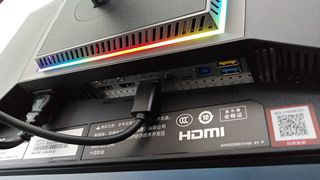
I’ve already let most of the AGON Pro AG246FK’s specs out of the bag, but let’s recap what this high refresh rate monitor has to offer. The screen comes equipped with a 24.1-inch 1080p 540Hz “Ultra-Fast TN eSports” panel with a 0.5ms GtG response time. Accompanying those competitive grade qualities are DisplayHDR 400 certification and AdaptiveSync Variable Refresh Rate (VRR) capabilities, alongside an anti-glare coating that keeps aggressive reflections at bay.
In terms of ports, the AG246FK comes with two HDMI 2.0 and one Displayport 1.4. I can already sense you PS5 monitor users out there reaching for your virtual pitchforks, but if we’re being honest, you’ll be using DisplayPort on PC to hit 540Hz anyway, as even HDMI 2.1 doesn’t support past 240Hz. I guess it’s a bit of a bummer if you’re aiming to use a console next to your PC, even though I’d suggest going for something other than a 24-inch TN panel in that case.
Design
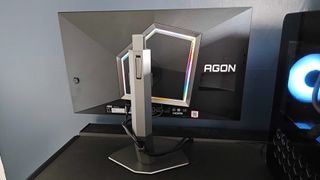
At a glance, the AG246FK looks like a fairly conventional 16:9 display, with the most notable thing on the front being the panel’s three-sided frameless design. The last thing you really want is any aesthetic that could distract you in competitive scenarios with a monitor like this, so I completely understand the need to keep things vanilla. Yet, AOC has reserved its freaky side for its pedestal stand, as for whatever reason, it uses an asymmetrical pentagonal base.
I imagine the look on my face was priceless when I went to line up the monitor, thinking I’d just placed it down at an angle, only to find it was purposely designed that way. It almost feels like it's mocking the Samsung Odyssey OLED G6 with its straight pentagon base, even though both use a low-profile approach that makes it easier to slide over soundbars like the Blueant Soundblade. Simply put, the weirdo stand beats V-shaped feet or any other desk-dominating nonsense.



There is something slightly funky going on with the AG246FK’s height adjustment and pivot approach, which had me messing around with the screen for a solid 10 minutes. When lifted to its max height, the bottom bezel will hit off the base when switching to vertical, meaning you’ll have to tilt it slightly to swivel things around. That’s perhaps not a biggie, but it was a strange hiccup in the otherwise smooth process of rotating the monitor.
Round the back you’ll find all the bulk you’d expect from a high refresh rate TN panel, with a hump integrating a two-port USB hub, video inputs, and even a pop-out headphone stand. If you’re into RGB, you’ll also potentially dig the lighting “ring”, which is just as oddly shaped as the monitor’s stand. I imagine some of you will be dragging this screen to LAN events where people can actually see behind the monitor, so putting on a show for them while you play is probably worthwhile. You’ll even be able to avoid cable management embarrassment thanks to some clips on the pedestal stand. Phew.
If you’ve read any of my monitor reviews, you know what’s coming next – the obligatory rant about OSD joystick controls. The AG246FK commits extra sins by using a ridiculously wobbly nub that dares to be the same shape as the stand. Good luck feeling any sense of direction with this movable button, as you’ll pretty much need to just fumble around and hope for the best.
Features


Like most monitors, the AGON Pro AG246FK has got an OSD menu filled with novel gaming options. In this instance, the screen splits these up into their own “Game Settings” menu, with other collective compartments including dials for “Luminance” and dedicated Picture-in-Picture and RGB lighting sections.
Keeping everything to the right-hand side of the display and having a shortlist of options in each setting does aid navigation, as I never felt stuck with where to find things. I would perhaps like settings like Freesync and HDR to be upfront and out of the way of the “sniper” overlays and other quirks, but that’s just what I’d do if I were putting together a monitor OSD.
It admittedly feels like a standard feature at this point, but the AG246FK does come with a two-port USB hub. These days, I’m not really fussed unless a screen comes with USB-C capabilities and Power Delivery that’ll satiate my handheld shenanigans. But, since you’ll likely be hooking up a gaming mouse and keyboard to your rig with this monitor to play competitively, you can at least do so via a single cable.
Performance
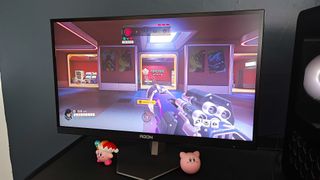
Alright, strap yourselves in, as we’re about to dive into the Wild West of high refresh rate gaming. To check whether I could feel the difference between this Agon 540Hz screen and other speedy displays I’ve used thus far, I stuck to primarily playing both Overwatch 2 and Halo Infinite multiplayer. To also ensure I was able to boost fps appropriately, I also used the Alienware Aurora R16, as I know for a fact the Nvidia GeForce RTX 4090 inside can deliver the PC performance required.
Playing Overwatch 2 at 540Hz felt a little surreal, with all my first-person movements noticeably translating as if in real-time. By that, I mean it was like watching something moving right before me in reality rather than the virtual realm. Weirdly, I’ve never experienced this when playing at 360Hz, but something about the unconventional jump here provides a whole new sensation entirely.
In practice, this meant that my twitchy reactions flying around as Pharah felt far more precise, resulting in missiles flying precisely where I needed them to. Visually speaking, the way I was playing looked frankly ridiculous, as I was throwing my mouse around in a way that wouldn’t normally be possible, but the fast refresh rate meant I was able to see everything clearly and move with intent. I would have potentially put all of this down to a placebo effect sparked by knowing it was a 540Hz screen if I hadn’t got Play of the Game four times in a row the other night – something that rarely happens when I play at 144Hz.
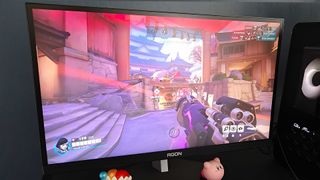
It’s also worth noting that I’m just off the back of finishing both my Hisense U7N and LG OLED G4 reviews, both of which are gaming TVs that can hit 144Hz. I naturally tried both the PS5 and PC versions of Overwatch 2 on those larger panels, and it helped amplify the benefits of using the AOC AGON Pro AG246FK at a desk. There’s a good chance I might not even go back to playing the hero shooter in the living room after this review, as now that I know how responsive and slick things can get with a monitor, the idea that I’m too slow will be lingering in the back of my head. Just to be clear, I am still very much a casual FPS player, but I think there’s a tiny part of all of us that wants to be at peak performance.
While I was able to consistently hit 540fps+ in Overwatch 2 to satiate the AG246FK, the same didn’t quite happen with Halo Infinite. Microsoft’s shooter is a bit more sporadic when it comes to maps and frame rates, and I averaged out at around 480fps. Still more than high enough to be considered competitive, but it does feed into the “do we need 500Hz monitors” argument. Again, I’m using an RTX 4090 build for testing, so there won’t be much enthusiasts can do to hit higher performance in this instance.
Despite that, Halo Infinite felt stupidly slick on the AG246FK. One of my most memorable moments using the monitor to play the shooter involved a Super Fiesta match where the objective was to wreak havoc with random powerful weapons. Did I use a M41 SPNKr or a fancy energy weapon to get the job done? Nope, all I seemingly needed was a 540Hz screen and a Mk50 Sidekick pistol. I came out the other side of that battle with more kills and no deaths.
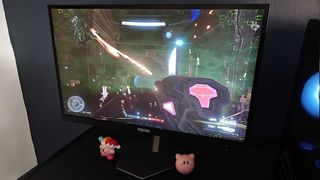
The extra responsiveness, stability, and sheer speed here are what I believe helped me ultimately up my game. Yes, I’m not what I’d call a skilled player, and I usually jump into multiplayer sessions for fun or to test screens like the AG246FK. The thing is if I can take advantage of 540Hz visuals as a casual player, imagine what either you or someone who’s fully dedicated to competitive play could achieve. Those few split seconds it’d take to swing around to make a shot on a slower screen can matter, especially if you’re up against fierce rivals.
So, we’ve established that the AG246FK is a speed demon, but what about its visual capabilities? I expected to find this AGON Pro model to be a little unsightly at 1080p, especially when running games I normally play at higher resolutions on an OLED. Yet, its abilities are fairly serviceable, managing to pull off colors that just avoid looking completely washed out and decent brightness too.
In Cyberpunk 2077, HDR provided Night City with the usual lick of realism I’ve become accustomed to, with glowing neon signs standing out against the game’s concrete jungle. You will notice some softness as a result of playing at 1080p, but if you keep the 24-inch monitor at an appropriate distance away, it won’t feel quite as obvious. I’m still of the opinion that if you’re looking to play new single-player adventures where frame rates aren’t a deal breaker, this probably isn’t the screen for the job. That said, if you mostly play FPS games and merely want acceptable results when you do occasionally launch into something else, you won’t be horrified by the visuals on show.
Should you buy the AOC AGON Pro AG246FK?
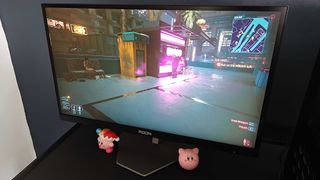
Whether you’re a budding esports player or just someone who likes getting competitive in your spare time, the AOC AGON Pro AG246FK is going to elevate your experience. You’re going to need a rig that can actually match its 540Hz refresh rate with appropriate performance, and this gaming monitor does trade away other visual qualities for speed. Still, if you’re hellbent on improving your performance in first-person shooters and want an ultra-response screen, opting for this display won’t disappoint.
As for the general player, I wouldn’t outright advise avoiding this monitor, but this TN panel might not feel like a big visual upgrade for $600. It’s fast, sure, and you’re not going to find many other models that can hit over 540Hz. What you will be able to grab is 360Hz screens like the Samsung OLED G6 for less than $200 more, which could be a much wiser choice due to its phenomenal colors and contrast.
In any case, I’d like to personally thank the AGON Pro AG246FK, as this gaming monitor made me feel like an esports pro, even if in reality I shoot like a stormtrooper.
How I tested the AOC AGON Pro AG246FK
For two weeks, I used the AOC AGON Pro AG246FK as my main monitor for playing FPS games. Specifically, I used Overwatch 2 and Halo Infinite with low settings enabled on an Alienware Aurora R16 gaming PC with an RTX 4090 graphics card to boost fps to match the displays 540Hz panel. During gameplay, I observed qualities like responsiveness and speed in addition to brightness and contrast to get a feel for whether the higher refresh rate comes with caveats.
In addition to those competitive FPS games, I also tested Cyberpunk 2077 in order to evaluate the screen's HDR and resolution scaling abilities. In turn, this helped a visual establish a comparison point between other reviewed monitors.
For more information on how we test gaming monitors and other screens, take a peek at our full 12DOVE Hardware Policy.
Looking for more screens? Check out the best 4K monitors for gaming and the best monitors for PS5. Alternatively, swing by the best gaming TV for large living room panels with a punch.

I’ve been messing around with PCs, video game consoles, and tech since before I could speak. Don’t get me wrong, I kickstarted my relationship with technology by jamming a Hot Wheels double-decker bus into my parent’s VCR, but we all have to start somewhere. I even somehow managed to become a walking, talking buyer’s guide at my teenage supermarket job, which helped me accept my career fate. So, rather than try to realise my musician dreams, or see out my University degree, I started running my own retro pop culture site and writing about video games and tech for the likes of TechRadar, The Daily Star, and the BBC before eventually ending up with a job covering graphics card shenanigans at PCGamesN. Now, I’m your friendly neighbourhood Hardware Editor at GamesRadar, and it’s my job to make sure you can kick butt in all your favourite games using the best gaming hardware, whether you’re a sucker for handhelds like the Steam Deck and Nintendo Switch or a hardcore gaming PC enthusiast.

Ahead of GTA 6, Take-Two CEO says he’s “not worried about AI creating hits” because it’s built on recycled data: “Big hits […] need to be created out of thin air”

Getting Over It creator Bennett Foddy threatens the world once again: If you want Baby Steps to be a brutal rage game, "you can inflict that on yourself"

A Simpsons Hit and Run Remake will probably never happen – and I don't want it to
